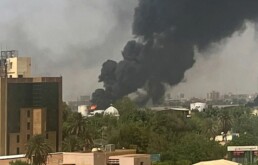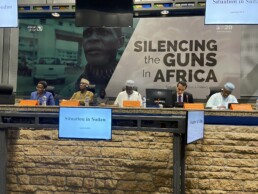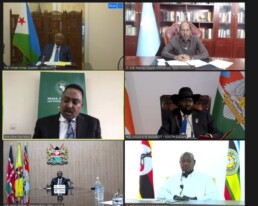Sudan's descent from a peace process to armed fighting and implications for the AU: the Urgency for more and sustained action
Date | 20 April 2023
Solomon Ayele Dersso, PhD
Founding Director, Amani Africa
Zekarias Beshah Abebe
Senior Researcher, Amani Africa
Since the outbreak of fighting on 15 April between Sudan Armed Forces (SAF) and the Rapid Support Forces (RSF), Sudan is witnessing one of its worst violence affecting various parts of the country, including the capital city Khartoum. The leaders of the two security formations General Abdel Fattah al-Burhan and General Mohamed Hamdan Dagalo, better known as ‘Hemedti’ have been serving as the head and deputy head of Sudan’s governing Sovereign Council after staging two military coups in concert in April 2019 and October 2021.
Unlike other previous armed conflicts in Sudan, the parties to the conflict and the physical spaces in which they are taking place are different. This fighting is taking place not only in areas previously affected by conflict such as Darfur but also in places such as Khartoum that was largely spared from the previous conflicts in Sudan. The fighting is also between two state security institutions: SAF and the RSF, with the leaders of the two vying for dominance. Both these features of this conflict make it hugely dangerous.
The fighting involving indiscriminate bombings and shelling in civilian settlements is already exacting huge pain and suffering to civilians. It is claiming the lives of hundreds of people, destroying civilian infrastructure and leaving people completely stranded without access to amenities & basic necessitates as well as health care for the sick and the wounded.

The foregoing dimensions of this fighting makes the need of cessation of hostilities in Sudan patently urgent.
Regional and international partners were quick to condemn the eruption of hostilities in Sudan, but it was too little, too late to prevent weeks of mounting tension from erupting into an open confrontation. There was every sign that tension was building up between the two sides for months, with the 13 April statement of the SAF spokesperson raising the alarm over the possibility of the collapse of security in the country following the alleged deployment of RSF forces in certain locations. Early warning issues were not heeded as regional and international actors opted for believing that the negotiations on the transition in Sudan involving the parties to this fighting is capable of preventing this eruption.
It also seems that the reactions of these regional, continental and international policy actors are proving inadequate.
For the AU, this is the latest in a series of armed conflicts that erupted in Africa that makes a mockery of AU’s agenda of Silencing the Guns. Instead of guns getting silent, more guns are getting into use and in Sudan the sound of the guns have become deafeningly loud. Nothing short of the very relevance of the AU and its progressive norms and institutions is at stake.
The AU Peace and Security Council – a standing decision-making organ for the prevention, management, and resolution of conflicts in the continent – convened an emergency session on Sunday, 16 April, which was a holiday where the AU is hosted. It is worth noting that the emergency session was held a day before it was initially proposed and despite that weekend being a holiday, all PSC members were present for the session, ten of them at Ambassadorial level.

The PSC issued a communique shortly after the conclusion of the meeting, condemning the armed confrontation and calling for an immediate ceasefire without conditions. It also rejected any external interference that could complicate the situation.
As part of the effort to end the violence and bring the two sides to the table, PSC’s emergency session underscored the importance of the plan of the Chairperson of the AU Commission to immediately travel to Sudan.
Meanwhile, IGAD Summit of Heads of State and Government also held an extraordinary emergency session on the situation on the same day as the PSC emergency session. Among others, the regional bloc called on the two parties, like the PSC, to ‘immediately and unconditionally cease hostilities’, and ‘allow unfettered humanitarian access’.

The key outcome of that IGAD summit was its decision to send a high-level delegation to Khartoum ‘at the earliest time possible’. The delegation is made up of South Sudan’s President Salva Kiir Mayardit, Head of delegation, Kenya’s President William Ruto and Djibouti’s President Ismail Omar Guelleh. The regional leaders delegation has as yet to travel to Sudan, with Burhan indicating that conditions are not conducive for the leaders to travel to Sudan.
The UN Security Council also discussed Sudan on 17 April under ‘any other business’ at the request of United Kingdom, the penholder on the Sudan. Earlier on 15 April, the Security Council issued press statement, urging the parties to ‘immediately cease hostilities’ and return to dialogue. The Arab league and European Union made similar appeal.
All the appeals left unheeded as fighting continues to rage in the capital and elsewhere in Sudan. Fighting has entered its sixth day. With every passing day, there is a risk of this vicious fighting escalating further and becoming more protracted, with heightened danger of worsening the suffering being inflicted on Sudanese people further.
The longer it also continues, the more susceptible it increasingly becomes for the involvement of forces from the region and beyond. This puts Sudan on the very dangerous ground of experiencing fragmentation that has been witnessed in Libya, with all its grave regional and international security ramifications.
What more should be done?
- The AU institutions and officials, working together with UN and IGAD as envisaged in the PSC communique, could engage in extensive diplomatic engagement by reaching out and speaking to various Sudanese social and political actors including civilian groups for identifying needs and for informed pursuit of the plan for travel to Sudan;
- The AU along with IGAD and UN also need to initiate humanitarian diplomacy with a view for establishing civilian areas to be war free zones where the parties should stop fighting and for the parties to conflict to guarantee humanitarian access for alleviating the mounting humanitarian crisis;
- The AU along with IGAD and the UN should also reach out and dissuade neighbouring and other countries to end and refrain from being drawn into the conflict;
- The AU should also put in place interdisciplinary emergency taskforce on Sudan that tracks, documents, analyses, and reports on the fighting including on violations of the PSC communique and international humanitarian law by the parties to the conflict; and
- The AU along with IGAD should on the basis of the work of the taskforce convene regular press conference and providing briefing with a view to show solidarity with the Sudanese people and mobilize public pressure on the fighting parties similar to the briefings of Africa CDC on the COVID-19 pandemic.
The content of this article does not represent the views of Amani Africa and reflect only the personal views of the authors who contribute to ‘Ideas Indaba’